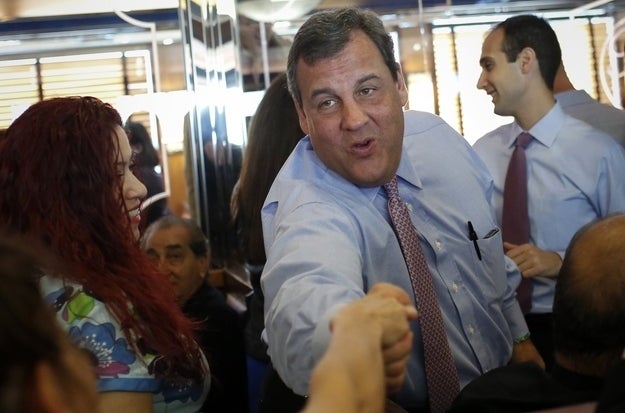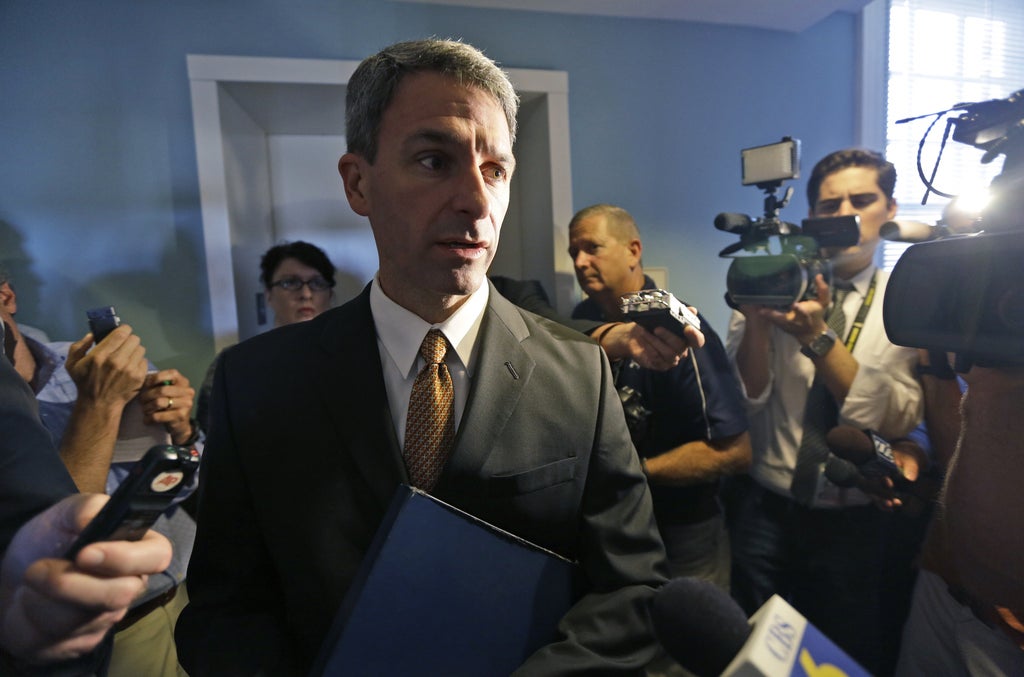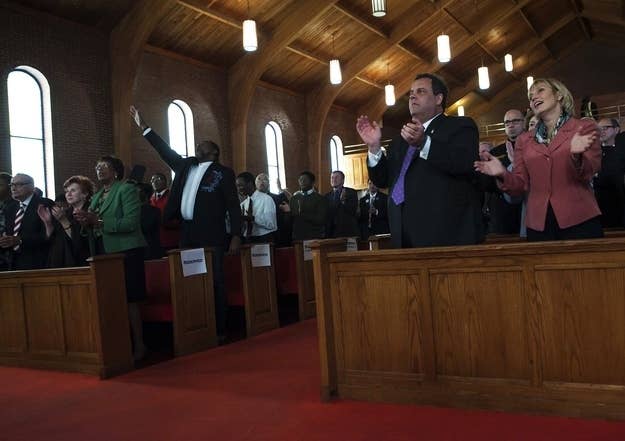

Chris Christie (left) and Ken Cuccinelli (right).
UNION CITY, N.J. — The setting of Chris Christie's final election eve campaign stop Monday night was designed for maximum shock value — a prepackaged political triumph all its own.
In the heart of this diverse, low-income neighborhood — a longtime Democratic stronghold — live salsa music blasted through the speakers, vendors hocked cold Cuban sandwiches, and hundreds of Latino residents bounced in place and rubbed their hands together to stay warm as they eagerly waited for a chance to cheer on their Republican governor. A large red and blue banner hung between two telephone polls declaring emphatically, "Union City Welcomes Governor Christie!"
Flanked by New Mexico Gov. Susana Martinez and Union City's Democratic Mayor Brian Stack, Christie sounded victorious as he spoke.
"This is the most amazing, extraordinary way to end a campaign," he said. "When I asked Brian if we could do this, a couple of months ago, I thought to myself, I wonder what it'll be like. I wonder what it'll be like for me to go up to Union City on the night before my election. I wonder who'll show up."
He paused briefly for dramatic effect, and then boomed into the microphone, "Well, look at you!"
The crowd went wild, and Christie basked in the knowledge that within 24 hours, every pundit in America would be pointing to his landslide reelection as a shining model for how to solve all the national GOP's problems — especially the party's abysmal minority outreach.
With polls showing him on track to win up to half of New Jersey Latinos and a quarter of the state's African-American vote on Tuesday, Christie will likely emerge on election night as a singular success story in the Republican Party's nascent post-2012 effort to "rebrand" itself and build inroads with minority communities through meticulous demographic research and expansive grassroots organizing. But while party officials are quick to hold up Christie's success with Latino voters as proof that their new push has promise, a pesky counterpoint lurks just a few hundred miles away in the form of Virginia's flailing Republican gubernatorial candidate Ken Cuccinelli. The two elections will provide the first real test of the GOP's expensive, vaunted minority outreach strategy — an effort that many in the party are counting on to change the dynamic in next year's midterms and in 2016.

Long before Christie took the stage in Union City, the Republican National Committee had come to the conclusion that the party needed to radically reform its appeal to minority voters. After a disastrous campaign cycle in 2012, the RNC commissioned an "autopsy" to figure out what went wrong for Republicans. Among the most urgent findings that came back was the GOP's failure to connect with minority voters, and the existential crisis the party could soon face if the problem isn't resolved.
"We heard about that constantly from November to March," said RNC spokeswoman Kirsten Kukowski. "Everyone was very opinionated that we need to go out there and start talking to these communities because frankly we had just let them go for so many years."
After the report was released, RNC Chairman Reince Preibus began popping up in barrios and black churches across the country, pledging a renewed Republican campaign to win the hearts and minds of minority voters, as well as a hefty $10 million investment in the effort. By summer, the party had decided to use Virginia and New Jersey — the two states with gubernatorial races this year — as test labs for their new outreach strategy.
The plan was more steady and workmanlike than brilliantly groundbreaking. In the case of Latino outreach, for example, the party started by building a comprehensive guide to the states' various Spanish-language media outlets, Hispanic evangelical churches, and local community power-brokers. They created a calendar of every Dominican pride parade and Hispanic Heritage Month street fair taking place across New Jersey and Virginia. They attempted, in effect, to map out the entire Latino electorate in two states — and then they handed all their intel over to the campaigns.
Next, the RNC sent full-time field representatives to each state with the express goal of helping the two candidates attract minorities. They were paid and trained to plan campaign events, schedule media appearances, marshal volunteers, register voters, and generally serve as campaign ambassadors to the communities.
Interviewed Monday, Kukowski was reluctant to pass judgment on how effectively the two campaigns used these resources, and she cautioned against assigning too much weight to the electoral outcomes on Tuesday night. A key part of the GOP's long-term outreach strategy is to build permanent relationships in these communities, and she said they didn't have time to fully accomplish that in one abbreviated cycle. (Most of the RNC's representatives on the ground in New Jersey and Virginia are expected to stay put well after election day, laying the groundwork for 2014 and beyond.)
She did say the RNC invested heavily in both races, and implemented similar plans in each state. But while Christie appears well on his way to a historic victory among Latinos — thanks, in part, to a $1 million Spanish-language ad campaign, and a well-organized get-out-the-vote effort that reached an estimated 166,000 Hispanic households — Cuccinelli's campaign has been an embarrassment to many Republicans who hoped he would better harness the resources made available by the party.
Cuccinelli's Republican critics say he has shown little interest in winning Latino votes in Virginia — holding firmly to a hawkish immigration agenda, and pushing his own campaign's token outreach efforts to the margins. His supporters argue that Latinos make up a relatively small portion of the electorate in Virginia, and that his time was better spent engaging Asian-American and black voters. But it's unclear what, if anything, he has done to work with those groups.
As one frustrated Republican official put it, "He's running a campaign of last year."
When Cuccinelli's Democratic opponent, Terry McAuliffe, ran a devastating commercial showing him compare undocumented immigrants to rats, many Latino Republicans in the state and at the national party level urged him to push back before the attacks hardened into conventional wisdom. Instead, he allowed the ad to go unanswered — content, many came to believe, with simply rallying his base of older, white voters.
Theresa Speake, chair of the Nuestro Cuccinelli Hispanic advisory committee, told BuzzFeed she regrets that the campaign wasn't more aggressive in responding to McAulliffe's attacks. Asked whether she thought they had done enough to push back, she said, "No, I don't, to be honest with you. I don't. But I think what happens sometimes is that when you begin to respond, what do they say, 'Thou speakest too loudly,' and sometimes people think it is almost like you're reacting because it's true."
She went on to say she would have preferred to more directly engage the immigration debate. "I personally would have, but I understand the campaign's position. This issue is not the most important issue of the campaign."
"I think that our committee could have been there longer, we could have been doing more things, but I think that as far as to say, did we have an outreach to the Hispanic community? Yes. Did it work? I think we're changing minds," she said.
Back in Union City, Team Christie was less equivocal. The governor's 10-minute speech included several allusions to the grand significance of his coming reelection — an indictment of anti-compromise partisans, a wakeup call to dysfunctional Washington, and so on.
Christie's press secretary, Kevin Roberts, was careful to note that his boss's success with Latino voters couldn't simply be replicated with big ad campaigns or salsa music at rallies.
"Primarily, it's who the governor is and the way he's conducted himself in office," Roberts said, describing the not-so-secret key to Christie's bipartisan appeal, including his "accessibility," "approachability," and "personality."
In a way, this is the biggest dilemma facing the RNC's outreach efforts: There's only one Christie. If the GOP wants to win races with a more racially diverse electorate, it will have to figure out how to sell candidates who don't have the magnetism of a cult leader and the ideological flexibility of a blue state Republican. What's more, if the party truly wants to rebrand itself among minority voters, Republicans will need strong, appealing standard-bearers who voters come to associate with the GOP. That's easier said than done.
Standing toward the back of the rally in Union City, a thin, bespectacled man wearing a tan-colored fedora and a brown overcoat tapped his cain on the ground to the rhythm of the music. He introduced himself as Señor Abreu, a 91-year-old Dominican immigrant who had been living in the U.S. for 31 years and long ago became a citizen. He said he had only ever voted for Democrats, but described Christie as a "a good man who works hard for his people... I hope he wins."
Asked how he felt about casting his first vote for a Republican, Abreu looked confused at first, and then shook his head insistently. "No es Republicano. Es Democrata."
With reporting from James Arkin.
Correction: Cuccinelli's running mate was nominated at convention. An earlier version of this article misstated how he joined the ticket.

